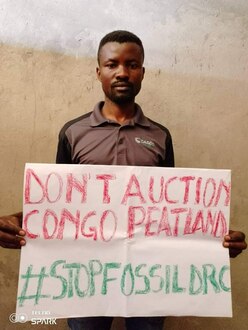-
Go Fossil Free TDSBClimate change is accelerating. We are witnessing the increasing impacts of a warming planet more and more consistently; in this last year alone our country experienced record-breaking heat, droughts, and hurricanes, which impacted hundreds of thousands of people and cost our country hundreds of billions of dollars. Hurricane Sandy alone caused $50 billion in damages. Experts agree that global warming caused by humans burning fossil fuels will continue to accelerate and intensify these tragic climate disasters. The scientific consensus is clear and overwhelming; we cannot safely burn even half of global fossil-fuel reserves without dangerously warming the planet for several thousand years.1 of 100 SignaturesCreated by Johanna Lewis
-
Invest in Happiness, Not Fossil FuelsClimate change is an urgent threat to our planet, and we must act now to protect our environment and health. Our generation deserves a future free from the harmful effects of fossil fuels, and UTEP can play a crucial role in leading the way. Join us in urging UTEP to invest in happiness, not fossil fuels, by signing this petition. Together, we can make a difference and ensure that our campus truly embodies the values of the Bhutanese kingdom that has inspired its beautiful architecture.10 of 100 SignaturesCreated by Brandon Carrillo
-
Call Fordham University to Divest from Fossil Fuels UrgentlyAccording to the United Nations, fossil fuels -- coal, oil, and gas -- are the most significant contributors to global climate change, accounting for over 75 percent of global greenhouse gas emissions. Greenhouse gas emissions trap the sun's heat, leading to global warming and climate change. Warmer temperatures are changing weather patterns and disrupting ecological systems. Additionally, the climate crisis disproportionately affects poor and marginalized communities. The lowest-income countries produce one-tenth of emissions but are the most impacted by climate change. These people are vulnerable to health risks, hunger, water scarcity, education, and work-related hazards. In the United States, an EPA analysis demonstrated that the most severe harms from climate change disproportionately affect vulnerable communities who are least able to prepare for and recover from heat waves, poor air quality, flooding, and other impacts. The fossil fuel industry contributes to public health harms that kill hundreds of thousands of people in the U.S. each year, dispositionally endearing Black, Brown, Indigenous, and poor communities. Extraction, processing, transport, and combustion of fossil fuels generate toxic air and water pollution. Exposure to fossil fuel pollution is linked to negative health impacts for people living near these pollution sources, especially particulate matter and ground-level ozone, which are correlated with respiratory and cardiovascular risks and premature mortality. Fossil fuels depend on and contribute to systemic racism in the United States. Racist practices, including redlining and housing discrimination, longstanding social and racial inequalities, colonization, indigenous genocide and removal, and elected official beholder to corporate power, create a system where the most dangerous impacts of pollution fall most intensely on the most disadvantaged, particularly Black, Brown, Indigenous, and poor communities. Climate change is the most pressing issue of our generation. Without immediate action, we risk pushing our planet into a position of irreversible damage. Within the past few years, we have witnessed significant increases in sea levels, global temperatures, and extreme weather. From Hurricane Sandy alone, New York City suffered 19 billion dollars in damages, displacing 70,000 residents and causing the death of 44 people. Unless we make changes now, storms of this intensity will increase in frequency and severity. Our Jesuit university is responsible for divesting without delay to show its support against the increasing ailments caused by the climate crisis.451 of 500 SignaturesCreated by Students for Environmental Action and Justice Fordham
-
McMaster University: Divest From Fossil FuelsAll of our futures are on the line. The evidence is unequivocal: continued investment in fossil fuels is wholly incompatible with efforts to avert the climate disaster. Time and time again, the university has demonstrated their complete disregard for the safety of students and the planet. They pretend to hear your concerns while failing to act in your best interests. We urge all members of the McMaster community to show your support for the striking students by adding your signature and sharing widely. Let’s show the administration that McMaster is hungry for change. ABOUT US: The McMaster Divestment Project is a student-run campaign advocating for the university to divest from the fossil fuel industry. As a part of the wider Divest Canada Coalition, we stand in solidarity with students calling for divestment on university campuses across the country. You can find more detailed information and connect with us on our Instagram: @mcmasterdivest. [1] facilities.mcmaster.ca/app/uploads/2021/06/McMaster-EMP-Report-2021.pdf [2] irena.org/-/media/Files/IRENA/Agency/Publication/2021/Jun/IRENA_Power_Generation_Costs_2020.pdf1,837 of 2,000 SignaturesCreated by Mac Divest
-
Divest University of Missouri From Fossil FuelsClimate change poses an unparalleled threat to our ecosystems, thousands of plant and animal species, and the wellbeing of many people across the globe. Fossil fuels are the primary cause of this threat. Divestment addresses the risks of climate change and balances these biased structures by placing additional social and fiscal pressures on polluters that are otherwise absent. By continuing to invest in fossil fuel companies, the University of Missouri is contributing to the ongoing damage to our planet. This contradicts and counteracts the other initiatives taken by the University to be “green” such as recycling, a growing use of renewable energy sources, and courses on sustainability. Climate change is accelerating, and we are witnessing its ever-increasing effects. We have been experiencing record breaking heat, hurricanes, droughts, and other extreme weather events, impacting the majority of the population. According to the World Meteorological Organization, “The global mean temperature in 2022 is currently estimated to be about 1.15 [1.02 to 1.28] °C above the 1850-1900 pre-industrial average” (Eight Warmest Years 2022). To reduce the risks of climate change, the Intergovernmental Panel on Climate Change (IPCC) advises that warming stay below 1.5°C. Ninety percent of coal and sixty percent of oil and fossil methane gas must remain in reserves to avoid catastrophic events from climate change (Meredith, 2021). Fossil fuel companies make a profit by extracting coal, gas, and oil. They have no intention of heeding this warning, making the investment in fossil fuel companies unethical. By remaining invested in fossil fuel companies, the University of Missouri is making a political statement: the University endorses the destruction of our planet for profit. We hope that you will join us in signing the petition to accelerate University of Missouri’s efforts to stand on the right side of this historic environmental, socioeconomic, and racial justice issue. References: Eight Warmest Years on Record Witness Upsurge in Climate Change Impacts. World Meteorological Organization. (2022, November 7). Retrieved January 5, 2023, from https://public.wmo.int/en/media/press-release/eight-warmest-years-record-witness-upsurge-climate-change-impacts#:~:text=The%20global%20mean%20temperature%20in,be%20fifth%20or%20sixth%20warmest. Meredith, S. (2021, September 16). Majority of Fossil Fuels Need to Stay Underground to Avert Climate Disaster, Scientists say. CNBC. Retrieved January 5, 2023, from https://www.cnbc.com/2021/09/09/climate-majority-of-fossil-fuels-need-to-stay-underground-study-says.html#:~:text=The%20peer%2Dreviewed%20study%2C%20published,Celsius%20above%20pre%2Dindustrial%20levels.1,023 of 2,000 SignaturesCreated by Mizzou Students
-
#CleanVaalRiverUnited we stand,divided we fall.2 of 100 SignaturesCreated by Brighton Phiri
-
CFN TestWe need everyone for this to be successful5 of 100 SignaturesCreated by Rukiya Khamis

-
Make me a vesselThe party is sweeter at the other side when we are many.6 of 100 SignaturesCreated by Akintunde Akinmolayan

-
Petition to ask for more moneyBecause of the cost of living increase in the country5 of 100 SignaturesCreated by Chris Kif

-
End fossil fuels in DRCOui pour proteger le foret du bassin du Congo On April 8, 2022 – just months after signing a $500 million deal with donors at COP26 in Glasgow, the government of the Democratic Republic of Congo (DRC) has approved a plan to auction off 16 new oil blocks[1], including some that are located in the Congo Basin - the world's second largest rainforest and one of the world's largest carbon sinks and most environmentally sensitive areas. Opening the DRC's forests to oil drilling would be an unimaginable disaster for the climate, biodiversity, human rights and local livelihoods.218 of 300 SignaturesCreated by Jeremy ARUSI

-
Non à l'exploitation du pétrole au parc des VirungaL’immense et riche diversité d'écosystèmes, de faune et de flore incomparable des Parcs de Virunga et Salonga qui est d’une valeur universelle exceptionnelle est aujourd’hui menacée par une série d’attribution des licences d'explorations pétrolières du gouvernement de la République Démocratique du Congo à travers le ministère des Hydrocarbures. Devant cette menace qui pèse sur ces parcs légendaires, classés au patrimoine mondial de l'UNESCO en même temps sites RAMSAR qui hébergent une biodiversité impressionnante dont des espèces rares et en voie de disparition qui n'existent nulle part ailleurs dans le monde, les communautés riveraines ainsi que la société civile locale s’est mobilisée pour s’opposer à ces licences d'exploration pétrolière qui auraient des conséquences dramatiques sur les vies et droits des communautés locales dont la déforestation, l'insécurité, la pollution, la destruction des moyens de subsistance des communautés et le dérèglement climatique. Les communautés riveraines ainsi que la société civile locale en appellent au gouvernement congolais pour le strict respect des lois de la République et des conventions internationales en matière de sauvegarde de l’environnement, de promotion et protection des droits des paysans, d’investissements prioritaires dans les énergies renouvelables pour promouvoir le développement durable des économies locales à travers des alternatives économiques existantes au sein des aires protégées. Elles exigent un arrêt immédiat du processus d’octroi des licences d’exploration du pétrole dans ces écosystèmes sensibles, notamment le projet de désaffection d’une partie du Parc des Virunga et d’une autre partie du Parc de la Solanga, tous inscrits au patrimoine mondial de l’UNESCO et faisant partie des sites RAMSAR.10,336 of 15,000 SignaturesCreated by Chris Kif

-
Stop investing Brighton and Hove's Pension Fund in fossil fuelsBurning fossil fuels (oil, coal & gas) - which releases the greenhouse gas carbon dioxide into the atmosphere - is the main driver of climate change. Massive reductions in carbon emissions will be necessary before 2030 if the world’s governments are to follow through on their stated commitment (‘the Paris agreement’) to hold global warming to ‘well below’ 2ºC, 'pursuing efforts to limit the temperature increase to 1.5º C. Failure to do so would be truly disastrous. In particular, the vast majority of proven reserves of fossil fuels will have to remain in the ground unburnt. Yet despite this, in 2019 the oil and gas industries were forecast to spend $4.9 trillion over the next decade on new oil and gas fields - none of which is compatible with limiting warming to 1.5°C. As of 31 December 2020, the East Sussex Pension Fund – the local government pension scheme for East Sussex, Brighton and Hove - had £76.4 million of local people's pensions invested in fossil fuels. These investments not only threaten the climate, but also pose a significant financial danger to the Fund. In 2015 the then-Governor of the Bank of England, Mark Carney, warned that investors in these fossil fuels faced ‘potentially huge’ losses from climate change action that could make vast reserves of oil, coal and gas ‘literally unburnable’. After coal demand peaked in 2014, UK public pension funds lost nearly a billion dollars as the value of their coal investments plummeted. Oil and gas are next. And the East Sussex Pension Fund's policy of ‘engaging’ with fossil fuel companies simply isn’t working. Indeed, despite many years of such ‘engagement’ not a single major fossil fuel company has yet re-aligned its business model with a 2ºC world, let alone a 1.5ºC one. And there are no precedents for a company changing its core business model following pressure from shareholders. By getting institutions like the East Sussex Pension Fund to publicly commit to divesting from fossil fuels, we can help to undermine the political power of the fossil fuel companies that continue to block effective action on climate change by the world’s governments. It’s time to divest from fossil fuels. Who supports divesting the East Sussex Pension Fund? - Maria Caulfield, Conservative MP for Lewes - Caroline Lucas, Green MP for Brighton Pavilion - Hastings Borough Council - Brighton & Hove City Council - Lewes District Council - Lewes Town Council - UNISON (the public service union) What else can I do? (a) Tell your friends, family and workmates about the campaign and ask them to sign the petition; (b) If you use social media then follow the campaign on Facebook [https://www.facebook.com/divesteastsussex] and / or Twitter [https://twitter.com/DivestEast] and share our posts; (c) If you're a member of the Pension Fund then please sign this petition to ESCC, calling on it to divest the Pension Fund from fossil fuels: https://tinyurl.com/memberspetition. The Council has claimed that 'There’s no evidence that most [East Sussex Pension Fund] members or other stakeholders consider divestment from fossil fuel companies a pressing issue ...' Help prove them wrong! You can also send a short message to the Chair of the East Sussex Pension Committee, the decision-making body for the Fund, using this adaptable template: https://act.350.org/letter/eastsussex152 of 200 SignaturesCreated by Rob Noyes












